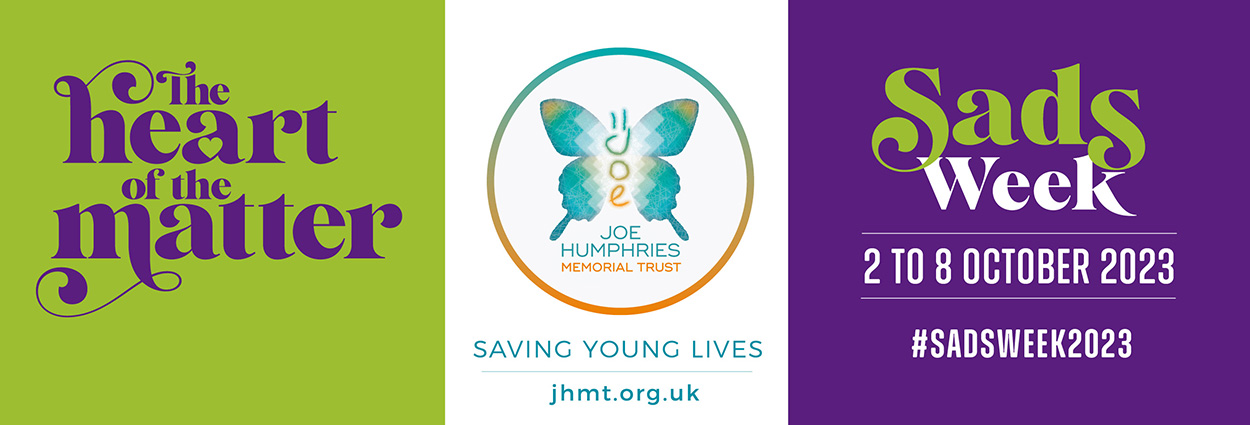SADS Awareness Week
2nd - 8th October 2023
The SADS Awareness week marks the 11th anniversary of the loss to Sudden Arrhythmic Death Syndrome (SADS) victim 14 year old Joe Humphries from Rothley who suddenly collapsed and died whilst out jogging on 4th October 2012.
To mark this key milestone in the JHMT calendar, on the anniversary of Joe's death, I would like to welcome you all to the annual SADS Awareness Week from 2nd-8th October 2023.
The focus of the JHMT SADS awareness week is to remind and educate healthcare professionals, sports-related professionals and parents and carers of young people about the dangers of undiagnosed heart conditions like SADS.
During the week, pertinent issues in relation to sudden cardiac death and SADS prevention in the young will take place across Leicestershire and displayed across various digital platforms.
On Monday 2nd October, we showcase the work being done by JHMT with our partners Public Health Leicester ( Leicester City's Council) Public Heath and East Midlands Ambulance Services to ensure equitable access to AEDs across Leicester as part of the Heartshield project, an important public health initiative in Leicester!
On Tuesday 3rd October, we focus on the importance of cardiovascular safety in sport. We review JHMTs contribution to the award-winning UK coaching e-learning module and its impact on the training of coaches across the country as first responders. We also highlight a fantastic AED flag initiative by Marijke van Eerd, one of JHMT's community trainers which we hope will become part of the standard of cardiovascular safety care!
On Wednesday 4th October, we highlight the partnership between the JHMT and University Hospitals of Leicester. Specifically, we are delighted to be involved in the development of the inherited cardiac conditions (ICC) service by funding the first ICC specialist nurse in UHL. We also hope to hear the story of a brave young patient living with an ICC which I am sure will be on interest to many young people living with the condition and their family members.
In addition, Steve Mears once again reminds us of the importance of why exercise is so important for us all!
On Thursday 5th October, we are once again providing hands-on training to help launch Loughborough College's TASS (Talented Athletes Scholarship Scheme) programme this year. We thank the college for the kind invite and look forward to this fantastic evening.
On Friday 6th October, we once again highlight the importance of cardiovascular safety in schools. This year, we visit Market Bosworth School where JHMTs Alan White will provide CPR and AED training to students and staff! We thank the school for partnering with us in SADS week.
In addition, during the week, there will be community events with Joe's Mini Heart -Start For Sports Clubs CPR and AED familiarization training CPR at several locations across Leicester and complete the week with the popular annual Joe's Bike Ride!
I would like to thank members of the JHMT medical team (Marijke, Mike, Elliott, Fraser, Alan, Steve M, Mike, Ffion, Chloe) and everyone behind the scenes including partners: EMAS, University of Leicester Hospitals NHS Trust, Leicester City Council, Charnwood Borough Council, UK Coaching, Loughborough College, Resuscitation Council UK, De Monfort University, Bosworth Academy, Leicester Rowing Club, Market Harborough Town FC u18s and the International Football Academy & for their fabulous efforts in contributing to this year's SADS awareness week programme.
This week is full to the brim of information for you. To read, but also to share. There is no age limit to knowing about CPR and AEDs. And you are the future. You can make a difference.
The difference that may have saved Joe's life 11 years ago. The difference that will save many young lives in the future.

As the patron of Joe's Trust (JHMT) I would like to thank everyone who has contributed so much time and effort to this year's SADS Awareness Week 2023 programme.
Once again, a timely reminder for us all about the importance of people having the basic CPR lifesaving skills and knowing how to use a defibrillator. What a bystander does or does not do in those vital few seconds and minutes following a collapse can be the difference between surviving or not, which tragically is the case for so many people every year in the UK (27,000 potentially survivable deaths including young people).
Simple Skills really do save lives and CPR can buy vital time. If more and people understand this one message during this year's SADS Week and take a few minutes to learn CPR so to be better prepared to save a life then we really can make further inroads into giving someone a better chance of survival.
SADS Week provides another timely reminder to all community sports clubs and organisations across the county and city that they can create a heartsafe environment with support from Joe's Trust (JHMT). The Trust's Free Joe's Mini Heartstart for Sports Clubs CPR and AED familiarisation training programme has led to over 5,000 people of all ages from over 300 clubs and groups being trained so far, as nothing is more important than keeping young people safe and by ensuring that as many people as possible know how to react in an emergency situation.
It's been another busy year at the JHMT with the ongoing partnership work with University Hospitals of Leicester (UHL), resulting in the appointment of Chloe Ferguson as the first Clinical Nurse Specialist in the Inherited Cardiac Conditions Services at Glenfield Hospital. This vital role which will benefit so many families who are affected by inherited cardiac conditions across Leicestershire, Leicester and East Midlands region. Many congratulations and well done to all those involved including those who have help raise the vital funds to make this post possible.
Once again, 'Thank you' to the loyal band of willing volunteers who, over the past 11 years, have given up so much of their time and sharing their many talents to help JHMT raise awareness of SADS and goal to reduce the incidence of sudden cardiac deaths in young people (12 – 35 years old) like Joe.

Show Your Support
Help JHMT save young heartbeats
Download Instructions
- Right-click on the link to the file you want to download.
- Choose "Save Target As …"
- Choose where you want to save the file on your hard drive.
- Click 'Save'.
Day 1. Monday 2nd October
Heartshield City
In the UK, there are more than 30,000 witnessed out of hospital cardiac arrests which take place every year, tragically only 1 in 10 people survive. That means someone in the UK is dying every 20 minutes following an out of hospital cardiac arrest. Immediate CPR and defibrillation can increase the chances of survival. One of the major factors highlighted in recent research is that there are gaps in key communities having access to this key lifesaving equipment. To address this, over the past 14 months, the public health team at Leicester City Council have been working in partnership with the East Midlands Ambulance Service and local heart charity, The Joe Humphries Memorial Trust to identify the current locations of defibrillators across the city and gaps in provision. We are now at stage where having identified where the gaps exist in the community, steps are being taken to provide a more better distribution of devices which are accessible 24/7 in case of a cardiac emergency.
We are therefore calling out to all those who have static defibrillators on their premises, which for many are only available during core office hours 9 to 5pm, to consider making them accessible 24/7 to help us create a heartsafe community for everyone in Leicester. If all the static defibrillators were moved to the outside of buildings many of the gaps across the city would be filled or reduced.
Time is of the essence in a cardiac emergency and every second counts. Every minute without any bystander intervention reduces the chance of survival by 10. Early defibrillation is an essential element of the chain of survival and prompt treatment within 3- 5mins of collapse, can lead to survival rates in excess of 50%.
Cardiac arrest can happen to anyone, anywhere, any time and any age including seemingly healthy young people, with over 80% of out of hospital cardiac arrests happening in the home. Everyone can be a lifesaver by learning CPR and having quick access to and being familiar with how to use defibrillator.
You too can make a difference during this year's SADS Awareness Week 2023, learn how to save a life by taking a few minutes out to learn Cardio Pulmonary Resuscitation (CPR) with the many free courses available online, get to know where your nearest device is located and join with us to create a heartsafe community for ALL.
We also need your help to spread the word, to encourage people who look after defibrillators within the city and county in places such as offices, communities, shopping centres and leisure centres, as well as in public places, to register them on a pioneering database called The Circuit: The national defibrillator network – go to: https://bit.ly/3NXPvt2
Rob Howard
(Director of Public Health, Leicester City Council)



Importance of CPR and AED – Skills For LIFE
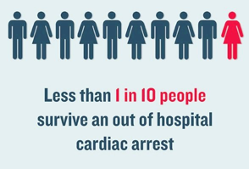
If you find somebody that has collapsed and is not breathing, they may have had a cardiac arrest. If CPR is started following a possible cardiac arrest and within 3-5 minutes a defibrillator is used, the chance of that person living increases from 6% to 74%!!! Only 22% of people in the UK would be confident in performing CPR on a stranger. This statistic has to change in society as a whole for lives to be saved. Anybody can be a lifesaver. Find out how JHMT is raising awareness of recognition of cardiac arrest and how to perform basic CPR and AED use. Within only a few minutes training you could be a life saver!
There is a defibrillator closer to you than you may think. It's a good idea to find out the closest one to your home, school, place of work, or any place that you go regularly. You will usually find a one at public places, like schools, your local Co-op, leisure centres and sports stadiums. There are apps like GoodSAM Responder and Staying Alive which you can use to help you.
Most importantly, anyone can do CPR and use a defibrillator. You can do no harm to someone who has collapsed and is not breathing. There is no requirement to be medically trained. Any member of the public could use a defibrillator to deliver a potentially life-saving shock to a patient. The defibrillator itself will guide you.
There is also not an age limit. Basic life support skills including resuscitation and defibrillation are now part of the schools national curriculum. If you are strong enough to push on a chest and are able to follow instructions from the defibrillator, you are able to perform these skills.
See below introductory videos with simple demonstrations on CPR and how to use a defibrillator (AED).
After looking at the videos, further information can be found following the ‘key links’ below:
- https://www.resus.org.uk/covid-19-resources/covid-19-resources-general-public/resuscitation-council-uk-statement-covid-19
- https://www.bhf.org.uk/how-you-can-help/how-to-save-a-life/how-to-do-cpr/cpr-training-videos
- https://www.goodsamapp.org/
- defibrillators
- https://www.jhmt.org.uk/cpr
- https://vimeo.com/399707203
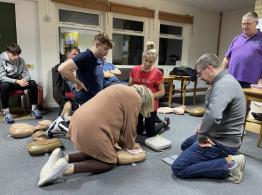


SADS Week community programme sessions

Session: Joe's Mini HeartStart for Sports Training
Date: Monday 2nd October & Tuesday 3rd October 2023
Location: Grace Dieu Manor Park
Joe's Mini HeartStart for Sports, CPR and defibrillator training session, led by lead trainer Alan Harrison White, will take place at Grace Dieu Manor Park with athletes from the FCV International Football Academy.
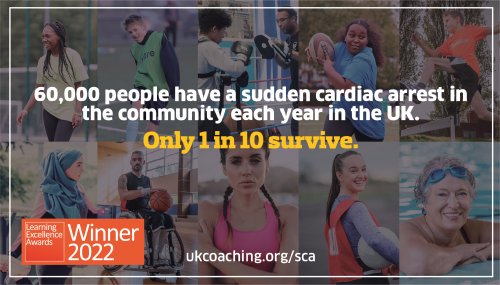
Day 2. Tuesday 3rd October:
HEARTSAFE SPORT TUESDAY
Every Second Counts: Learn how to save a life with UK Coaching's free digital learning toolkit
This SADS Week, UK Coaching is once again reminding coaches, organisations and anyone involved in sport and physical activity to complete the free life-saving course, which takes approximately 30 minutes to complete.
A Sudden Cardiac Arrest (SCA) can happen to anyone, anytime, anywhere, though by being prepared you can help save a life.
The digital toolkit and e-learning course, developed in collaboration with Resuscitation Council UK, St John Ambulance, and the Joe Humphries Memorial Trust, aims to equip individuals with the knowledge and skills needed to respond swiftly to an SCA incident using CPR and an Automated External Defibrillator (AED).
Funded by Sport England, the toolkit is designed for anyone involved in the sports and physical activity industry, including coaches, personal trainers, club organisers, referees, volunteers, parents, participants, and spectators. Everyone has a role to play in increasing the chances of survival through proper knowledge, training, and support.
In the UK, around 60,000 people experience an SCA outside of a hospital setting each year, with only 1 in 10 survive. However, immediate and effective action can triple the chances of survival.
Mark Gannon, UK Coaching CEO said: "What could be more important than knowing how to save a life? We know that great coaches change people's lives and communities every day through the delivery of sport and physical activity. On occasion, they may literally have to save a life.
"Sudden cardiac arrest is something we all need to know about and take responsibility for. The stark fact is, if more people were trained in CPR and how to use a defibrillator then more people would be saved.
"That is why, collectively, we created a digital learning toolkit that reduces the fear and shock of an SCA and increases people's response rate by being prepared to act. This training is free, simple and a must for all coaches."
The immersive digital course offers practical skill development exercises, including virtual chest compressions and the use of a virtual AED. Learners are placed in a real emergency simulation where every decision and moment are critical. The course also employs animation, infographics, and diagrams to convey essential information and keep participants engaged.
Learn to be quick, be smart and restart a heart on UK Coaching's FREE eLearning course https://www.ukcoaching.org/sca



Flying the flag: Project three minutes – when every second counts!

Imagine this scene….
You have just arrived for match day with your young teenagers. It's an away game, you are directed to the car park and you find your way to the sports fields, where several matches are already taking place. You check for familiar faces and see your team colours somewhere in the distance. Your children run towards their coach and you brace yourself for the next few hours on the sideline.
Do you know what to do if one of the young people playing football would collapse? You probably know to call 999, you may have done some CPR in a distant past and you are aware that more and more places seem to have a defibrillator on the wall. But would you know what to do? and would you do it?
- How long do you think it would take for you to locate the local or nearest AED?
- The pavilion is visible in the distance, you can't quite recall if you had seen the familiar yellow box on the wall… or may be a green lightning sign?
- If you saw an AED, would you use it? Even if you have never seen one close up?
- And how much time do you have? How long from collapse until the changes of survival are reduced to only 10%?
All those questions are probably not on the forefront of your mind, as most sports events pass without any serious casualties, maybe a broken arm, or some clashing of heads, but a cardiac arrest? That probably wouldn't happen to you.
Until it does!
Every week, at least 12 young people will die from a sudden cardiac arrest in the UK.
Currently, their change of surviving this is 10%. 1 in 10 of them will leave the hospital alive. 9 will die.
Many communities now have AEDs and this is making a real difference. But the time from collapse to first shock is often delayed by the time it takes to run to the nearest AED or to call 999 and wait for an ambulance.
Good CPR will buy you some time, but it is the shock that is needed to give this person a chance to survive.
Although population screening can find some underlying heart problems, too many sudden collapses are unexpected and unexplained and will not be avoided by screening. Screening can sometimes cause more harm than good.
Population first aid training, defibrillator availability, and rapid deployment are the critical factors to improve outcomes.
A growing number of sports facilities now have a defibrillator. However, these can be behind locked doors, or there might be multiple entrances.
Some sports teams are now carrying pitch side defibrillators: this is excellent for them, but surrounding teams will not necessarily be aware that there is an AED on site.
Many companies, public places and sports facilities have defibrillators inside their buildings, but these are not always clearly visible to passers-by, could be locked away or only get accessed by first aiders or first responders.
There is currently no recognised national signage of a precise defibrillator location.
They are easily transported, quick to erect, and highly visible to contrast with (typically) green sports fields, but can be used anywhere.
Project three minutes – Improving emergency response time
Background
This work was triggered by some cases in which we were involved. Patrick and me ( Marijke - member of JHMT medical group) have been working to improve all phases of defibrillator response, including availability, recognition, localisation, and utilisation.
Regular CPR/AED training has been provided to coaches from Nottinghamshire sports clubs to ensure there is increased awareness of the importance of all phases.
The Under 16 Cliftonettes Netball team hosted a curry and quiz night, raising £6K, which bought 5 pitch-side defibrillators (two for Cliftonettes, one for Colts football club, and two for local schools).
We are both passionate about improving outcomes in these otherwise fit and healthy young people.
Although population screening can find some underlying heart problems, too many sudden collapses are unexpected and unexplained and will not be avoided by screening. Screening can sometimes cause more harm than good. Every week in the UK, 12 young people will collapse and die from a sudden cardiac arrest.
Population first aid training, defibrillator availability, and rapid deployment are the critical factors to improve outcomes.
Ensuring that an AED reaches someone when they have had a sudden collapse can be a challenge. It takes time to run to the nearest AED, and sometimes the location can be unknown until the 999 call has been made.
Project three minutes wants to make a difference by improving the time from collapse to first shock. Using a flag to make sure the AED is visible at all bigger sports events can make a big difference. This project is especially aimed at big events where a portable unregistered AED is carried by coaches and not always visible.
Over the past few years, defibrillators (AEDs) have become more and more common around the UK. The target time from collapse to defibrillator use is only
3 minutes
Community cardiac arrest cases we have been involved in typically have collapse to shock times of 7-12 minutes.
There are three critical parts to the successful use of a defibrillator:
Need it?
Recognition that a defibrillator is needed.
Find it!
It is important that the location of the nearest AED is known so it can be brought to the person who has collapsed.
Use it!
The defibrillator needs to be used as per instructions whilst CPR is ongoing.
Back at the sports match: While you stand by the sideline of the sports field, you spot a large orange flag pointing to an AED underneath it. You scan the QR code and see the familiar information about how to do CPR and although you knew it vaguely, seeing it again reminds you what you should do. As for the AED: well, it's there, and now you have given it some thought you think you would act if anything happened. You scan the fields and see your child running around trying to get the ball. You hope with all your heart that you would never have to do this to anyone you love so much….
Project three minutes feature by:
Marijke van Eerd, Paediatric Advanced Clinical Practitioner
Children and Young People's emergency department Nottingham University Hospitals NHS Trust & member of the JHMT Medical group & & Patrick Davies, PICU consultant, Nottingham University Hospitals NHS Trust
Stay Ahead Of The GAME - Don’t let it take a cardiac emergency! before taking steps to be PREPARED for Sudden cardiac Arrest


Play Sport, PLAY HEART-SAFE
So How Can The JHMT Help?
The JHMT have pioneered the Joe's Mini Heartstart for Sports programme which provides free training for club members, supporters, coaches and officials which is endorsed by BHF and Leicester City Council. They also provide help and support to Leicester and Leicestershire community sports clubs who are wanting to purchase a defibrillator. Information on cost, choosing the right defibrillator and how to purchase including useful contacts can be found at: https://www.jhmt.org.uk/community-aeds
More than just a game – being PREPARED is key
JHMT advocate the need for sports clubs, groups and organisations at all levels to be prepared and ready to deal with a cardiac emergency. Players and club officials, in addition to club coaches and volunteers, have a vital role to play by knowing how to apply CPR and how to use a defibrillator.
JHMT is also very committed to maximising the availability of Defibrillators to the wider community. In essence, rather than having the Defibrillator locked away in a pavilion and therefore inaccessible for much of the time, JHMT seeks to actively encourage the placing of Defibs in an external Cabinet so that it is available to the wider community 24/7. This encouragement includes, where circumstances are suitable, donating an external Cabinet to the Club, with the only cost to the Club being that of fitting (including an associated electrical feed for the defibrillator).
SCA happen to Anyone, Anywhere, Anytime and any AGE– including seemingly fit and healthy young people, 12 – 35 years old due to undiagnosed heart conditions like SADS. Recognising any warning signs and acting promptly (with more people trained in basic CPR skills and being familiar with and having quick access to a defibrillator, including players, coaches, officials and having quick access to an AED ) can mean the difference between life and death.'
To find out more on how Joe's Trust ( JHMT) can help your club/ organisation to create a heart safe sporting and community environment go to https://www.jhmt.org.uk/impact
"Wherever sport is played, a defibrillator should be on site and readily accessible. When every second counts, it could be the difference between life and death. Immediate CPR is crucial whilst the defibrillator is brought to the patient and it's also vital that as many people as possible have CPR skills, including players, officials and spectators as they may be the closest to where someone has collapsed." – Charles Poole – JHMT
Why does my club need an AED?
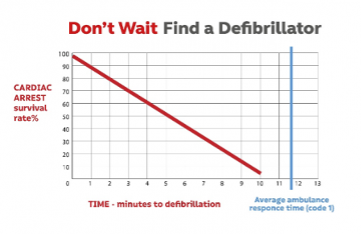
There is a lot of research which has shown that prompt CPR and early defibrillation gives better survival. In the UK survival after out-of-hospital cardiac arrest is under 10%. Having an AED at your pitches, clubhouse or with the coaches enables much quicker defibrillation should disaster strike. In many sports areas if you don't have a AED on site then, on average, it will take between 8 and 16 min to run to a AED and back. If it takes 8 minutes the chance of survival is 20%. With a defibrillator onsite this delay may be more like 2-3 minutes giving a survival rate 70-80%.
So, what can your club do?
There are some easy steps to ensure your club is as safe as can be:
- Encourage members, coaches, parents, volunteers, players, officials to sign up and complete the SCA eLearning module – go to: ww.ukcoaching.org/sca
- Through the Joe's Mini Heart-Start for sports clubs programme (live link), JHMT can provide free CPR and defibrillator training to your members. For further details email JHMT – jhmt@jhmt.org.uk
- Have a defibrillator at your club which is readily accessible. For further help and support email JHMT – jhmt@jhmt.org.uk.
- To find out more on how Joe's Trust ( JHMT) can help your club/ organisation to create a heart safe sporting and community environment go to https://www.jhmt.org.uk/impact
Don’t Be Caught Out!
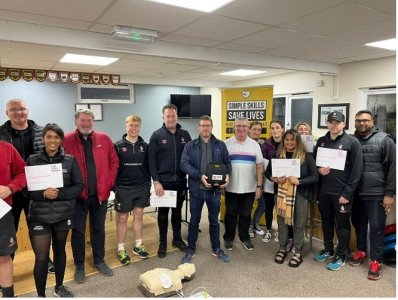


SADS Week community programme sessions

Session: Joe's Mini HeartStart for Sports Training
Date: Tuesday 3rd October 2023
Location: Upperton Rd, Leicester LE2 7AU
CPR and defibrillator training will take place with members of Leicester Rowing Club and West End Running Club, who now have a public access defibrillator on site in a box donated by JHMT to demonstrate their commitment to creating a heart safe environment for all their members at club and the local community in the West End of the city.
The session will take place as part of JHMT's life-saving training programme, Joe's Mini HeartStart for Sports - and led by Dr Fraser Goldie and EMAS Paramedic Elliott Forman.

Day 3. Wednesday 4th October:
Getting to the HEART of the matter
University Hospitals of Leicester ( NHS) Trust - Inherited Cardiac Conditions Clinic update
By Harshil Dhutia, Consultant Cardiologist, Glenfield Hospital UHL, Medical lead for JHMT
The Joe Humphries Memorial Trust (JHMT) has a long-standing partnership with University Hospitals of Leicester.
This year, through funds raised from our fantastic supporters, the JHMT was able to fund the first inherited cardiac conditions (ICC) specialist nurse in the region.
Chloe Ferguson (@ChloeFerg3) joins Dr.Harshil Dhutia (Consultant Cardiologist @harshil_dhutia) in delivering high quality specialist care for patients with #ICCs and their family members. The care of such patients in a specialist ICC service is strongly endorsed by the NHS National Service Framework Chapter 8.
The clinic offers an integrated assessment of patients with ICCs from diagnosis to risk stratification to treatments. To enable families to be seen together in a convenient one-off appointment, the ICC clinic at UHL has a one stop clinic set-up in the pipeline where patients get access to specialist nursing, dedicated cardiac genetic counselling and cardiac physiology.
Since inception in 2020, the UHL ICC clinic has provided expert care for over 200 patients with #ICC, and offers a tertiary regional service to patients from Derby, Kettering and Lincolnshire. The service is registered with the Association of Inherited Cardiac Conditions (https://www.theaicc.org/directory-of-aicc-services-2/leicester)
The clinic supports the JHMT in raising awareness of #ICCs such as #SADS by delivering regional and national teaching of healthcare professionals. The service also contributes to local and collaborative research studies to better understand these conditions.
Quality improvement is a key focus of the UHL ICC service. It is currently one of 6 centres across the UK involved in the @ BHF sudden cardiac death pilot project (https://openaccess.sgul.ac.uk/id/eprint/115084/1/s00292-022-01143-8.pdf) to standardise the care for patients following SCD and provide expert evaluation of at risk surviving family members.
If you or a family member feel you would benefit from the UHL ICC service, please do not hesitate to contact the team via inheritedcardiacconditions@uhl-tr.nhs.uk
For more information on ICCs: icc-clinic
For information on JHMTs contribution to the ICC service: https://tinyurl.com/337sj879
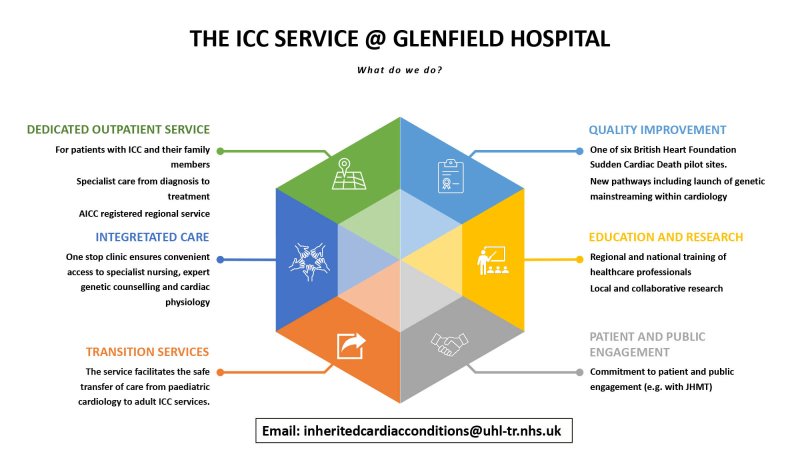
Benefits of Exercise – Dr Stephen Mears
Whilst it is vitally important to use this week to raise awareness of SADs, it is also important to remember that exercise has many benefits particularly in terms of physical and mental wellbeing. It is well known that exercise plays a key role in preventing and treating a range of cardiometabolic diseases including reducing the risk of heart attacks and strokes, and can help regulate blood glucose to reduce the risk of developing Type II diabetes. Exercise can also help regulate blood pressure and depending on the type of exercise can be beneficial for bone density, reducing the risk of osteoporosis developing in later life. Exercise can also be great for increasing energy expenditure, helping to control weight management. But exercise has many more pluses than just physical benefits. For many, it can play a key role in positive mental health. Exercise can act as a great stress reliever, improve mood and provide an engaging social aspect. It can help reduce anxiety and be a great way to meet new people.
There is a variety of research into the type of exercise that is beneficial, with benefits associated with different activities including running, walking, cycling, team sports, and high intensity sprints to name a few. As a general rule of thumb if heart rate increases then there is a likely beneficial effect. There is even some evidence to suggest that simple activities such as reducing time sitting by standing at your desk can increase energy expenditure. As a guide the NHS and American College of Sports Medicine suggests that healthy adults aged 18-65 take part in moderate intensity physical activity for at least 30 min, five times a week.
It is important to remember to exercise at an appropriate level and intensity to your fitness and progressively build over a number of weeks. If you are new to exercise, the NHS website has some excellent advice about getting started, and the Couch 2 5K programme provides an easily attainable and progressive way to run or walk 5k. A great event to take part in is a parkrun. Held every Saturday at 9am, thousands of people at lots of different venues around the country complete a 5km event that is great at encouraging participation. If you haven't done one before, then find your local run here. All you need to do is print off your barcode before you go. Sport is a great social opportunity, so check out local sports and clubs in your area to see how to get involved.
We have seen this week that a small number of people taking part in exercise can have underlying cardiac problems. It is extremely important that the work of the Joe Humphries Memorial Trust helps support exercise, sport and physical activity by ensuring that as many people as possible are CPR trained and that events and activities have easy access to an AED, so that if something does happen, there is the best chance of survival.
Dr Stephen Mears
Senior Lecturer in Sport and Exercise Nutrition
School of Sport, Exercise and Health Sciences
Loughborough University


Day 4. Thursday 5th October:
SADS In Sport workshop as part of Loughborough College’s Talented Athlete Scholarship Scheme (TASS)
New students joining the College's Talented Athlete Support Scheme Dual Career Programme will gain vital knowledge which could mean the difference between life and death at a workshop on campus delivered by the Joe Humphries Memorial Trust (JHMT).
Dr Harshil Dhutia, Consultant Cardiologist, Glenfield Hospital UHL, Medical lead for JHMT, will deliver a SADS in Sport talk to increase awareness and understanding of underlying heart conditions that can effect athletes and those who participate in high level and regular sport and physical activities and how everyone can be better prepared in case of a cardiac emergency on and off the field of play. Following the SADS in sport talk, the students will then get 'hands on' to learn vital CPR skills and how to use a defibrillator with JHMT's lead Trainer Alan Harrison White.
Steve Wilkinson - FE Sport Tutor & Dual Career Coordinator Loughborough College - said:
"The recent unfortunate events at both West Bridgeford and the Euros in relation to Christian Eriksen has highlighted and heightened the need for anyone involved in sport to have a defibrillator and CPR training event.
The TASS induction evening and its links with JHMT give us the perfect opportunity to make sure our student athletes have the skills to save a life. This event will form part of the ongoing national promotion by UK Coaching of the online SCA digital toolkit qualification for sports coaches at all levels and importance of defibs across the whole sports and physical activity sector.
We are delighted to be part of this process that helps increase awareness while also training coaches how to deal with lifesaving situations."
TASS Scheme:
Loughborough College is one of few colleges in the country to offer TASS Accreditation for FE learners. The college achieved the accreditation in May 2018 after years of work supporting, guiding and mentoring learners and elite athletes manage education and elite sport performance. The national recognition was reward for this work and the college now has two Dual Career Coordinators who can support up to 60 athletes in managing their lifestyle, education programme, training and competition, as well as regular workshops.
The college support includes advice on nutrition, hydration, finance, lifestyle management, scholarships as well as regular support meetings. The DCC's will help you manage your time and training workloads, prepare for assessment deadlines while also working with coaches, fitness and have links with other elite sport support teams.
Since 2018 the college TASS programme has supported World record holders, European champions, and international athletes from team sports as well as helping the progress of gymnasts, runners, pole vaulters, netball players, footballers and golfers. Our learners study a variety of topics from Engineering, A' levels, Art, Public Services and Sport.
If you are competing at national level or above and want to be part of the TASS dual career scheme complete the following application form and return it to sportadmin@loucoll.ac.uk
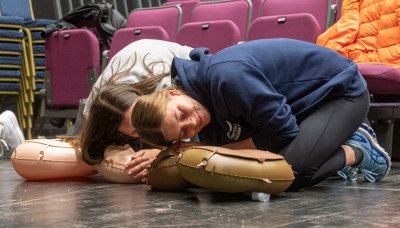


SADS Week community programme sessions

Session: Joe's Mini HeartStart for Sports Training
Date: Friday 6th October 2023
Location: Market Harborough Town FC – Market Harborough
Joe's Mini HeartStart for Sports, CPR and defibrillator training session, led by lead trainer Alan Harrison White, will take place with members of Market Harborough Town FC u18s

Day 5. Friday 6th October:
HEART-SAFE Schools – The Market Bosworth School
The Market Bosworth School Is Proud To Support Local Life Saving Initiative
The Market Bosworth School is proud to support the Joe Humphries Memorial Trust (JHMT) this October as they launch their annual SADS Awareness week.
SADS stands for sudden arrhythmic death syndrome, a collective term for a group of deadly genetic heart conditions which cause a disturbance with the heart rhythm and can lead to sudden cardiac arrest. The week marks the tragic passing of 14-year-old Joe Humphries from Rothley who suddenly collapsed and died whilst out jogging on 4th October 2012.
The Market Bosworth School, rated Outstanding by Ofsted, has been working with the charity who provided the Academy with an outside cabinet for their second Defibrillator, giving access to the wider community and providing a prime spot for outside activities such as field based sports. In addition to this, JHMT has provided lifesaving training on how to use a Defibrillator for their students. It is important for The Market Bosworth School to spread awareness of SADS amongst its community particularly as one of their students suffers with Long QT syndrome, a condition that causes a problem with the electrical system that controls your heartbeat.
SADS Awareness week will launch on Monday 2nd October 2023, which The Market Bosworth School will be offering another training for a group of students as part of the charities Educational Programme. During the week, pertinent issues in relation to sudden cardiac death and SADS prevention in the young will take place across Leicestershire and will be displayed across various digital platforms including The Market Bosworth School social media channels.
Academy Business Director, Bianca Farrell stated,
"Knowledge is power! The survival rate from a cardiac arrest in the UK is less than 10% as an average, but it could be 90% if bystanders immediately start CPR and there is access to a public defibrillator within 8 minutes. By supporting SADS week and providing our community of students and staff with the information and training to develop skills that could save lives is invaluable.''
Parent of a child at TMBS Says:
When Lewis first started TMBS I was very anxious due to his long QT syndrome but from the start, the school have been helpful and proactive in ensuring Lewis has access to necessary lifesaving equipment and that staff are training in basic life support. In particular, Mrs Farrell has been brilliant in liaising with both myself and we then approached JHMT to help fund another defib device that not only helps Lewis but the wider school community. Lewis was also able to attend the PGL trip with all the relevant care plans in place and staff that were trained appropriately to ensure he had a great, safe time. The worry never, ever goes away but it does bring me some piece of mind that TMBS have taken his condition seriously and have gone above and beyond with training staff and obtaining more defibrillators.''
Assistant Principal adds:
'We are always striving to provide TMBS students with the skills to take with them beyond school. We are so proud to have students that embody our core value STEER (Success, Together, Enjoyment, Engagement, and Responsibility) and this opportunity was no different'
Alan White, Lead Trainer for Resuscitation at the JHMT has been delivering the training sessions to students at the school said:
"There are about 600 deaths a year across the UK from SADS. There are often no warning signs, it can happen out of the blue and happen very quickly. For each minute delayed in performing CPR and defibrillation chances of survival are reduced by 10%. But simple skills save lives. That's the message I want these young people to leave with when I talk to them. It's not difficult but it can be very, very frightening when it happens so that is why we are training them so that they know what to expect and what to do if it happens."
Student quote following the training with JHMT's Alan White:
After training I feel much more capable to be able to save a life, if someone went into cardiac arrest. I look forward to future training to help refine and build on my abilities.'


Message to schools – Anyone can be a lifesaver
A heart attack is different from a cardiac arrest – in a cardiac arrest the heart stops pumping and that person will die within 10 minutes without help. A cardiac arrest can happen to a seemingly fit young person. In the UK there are approximately two deaths per day in young people aged 12 – 35: one of them could be your friend! There are two easily understood actions that may save that person's life: the first is prompt CPR and the second is the early application of a defibrillator (AED). Training only takes 30 – 45 minutes. Schools now provide this training and all pupils should ask if they can undertake these lifesaving skills. This means that when you see someone collapse you will not panic, but try and save their life.
Key Links:
- https://www.resus.org.uk/get-involved/restart-heart-day
- https://www.bhf.org.uk/how-you-can-help/how-to-save-a-life/cpr-training-in-schools
- https://www.resus.org.uk/public-resource/cpr-schools
- https://www.resus.org.uk/public-resource/how-do-cpr
- https://www.resus.org.uk/public-resource/defibrillation
- https://www.resus.org.uk/watch
- http://bhf.org.uk/revivr

Restart A Heart Day - 16th October 2023
Your two hands could help save a life
Your two hands can help save a life: Anyone can be affected by a sudden cardiac arrest at any time, and without intervention, the person will quickly die. When someone collapses and stops breathing normally, it is important to quickly call 999, perform CPR and use a defibrillator. This gives the person their best chance of survival. If reluctant or unable to do rescue breaths, hands-only CPR will still give the person the same chance.
Survival rates from out-of-hospital cardiac arrest remain stubbornly low in the UK, with fewer than one in 10 people surviving.
Restart a Heart (RSAH) is an annual initiative led by Resuscitation Council UK which aims to increase the number of people surviving out-of-hospital cardiac arrests.
Every October an alliance of partners all over the world - including UK Ambulance Services, universities, and other charitable and public sector community-based organisations and first aid training organisations - come together to increase public awareness of cardiac arrests and the number of people trained in lifesaving CPR and defibrillation,
They do this by organising and facilitating training events and also by providing opportunities for people to learn CPR and defibrillation digitally in the safety and comfort of their own homes.
Launching this year on or around 16th October, Restart a Heart 2023 will be actively promoting the use of public access defibrillators and highlighting health inequality around access.
Whether you're hosting an event or attending one, teaching in person or learning online, you have a key role to play in improving survival rates from out-of-hospital cardiac arrest. You can ensure that everyone has a chance to learn CPR and how to use a defibrillator and that those having a sudden cardiac arrest have their best chance of surviving.
Find out how you can get involved at https://www.resus.org.uk/get-involved/restart-heart-day


JHMT Annual Bike Ride (10th)
Sunday 8th October 2023

Location: Rothley to Staunton Harold.
The JHMT annual Bike Ride (no 10!) as part of SADS week will be from Hornecroft in Rothley with an 8.30 am start time- and then proceed on a rural route through Leicestershire and Derbyshire to the cafe at Staunton Harold. The route is 40 miles and we expect it to finish mid afternoon. It is a great way to finish Summer and the Bike Season.
On returning to Rothley there is an option of a team drink at The Woodies pub, Rothley.
The ride is strictly for 16s and over and under 18s must be accompanied by an adult.
This is an informal event and the Trust takes no responsibility for health and safety. Those joining us are assumed to be aware of the Highway Code, experienced cyclists and will bring suitable tools to deal with any mechanical issues! The route is suitable for road bikes.
See below web site with all the route details:
https://hissett.wixsite.com/mysite
https://connect.garmin.com/modern/course/24817366
For further details please contact Simon Taylor on Telephone: 07733 124867.
Come along for the ride, all in aid of a great cause – it is a great favourite with those that have taken part before.

Inspire Awards
JHMT Inspire Awards small grants - helping young people (13 – 21 yrs old) from the city and county fulfil their potential, develop their talents & make a difference across the community.
JHMT Inspire Awards of up to £500 are handed out to young people aged 13-21 from Leicester and Leicestershire to help them fulfill their ambitions in the fields of music, arts, sports and community endeavour. Since the awards' inception in 2014, more than £37,000 has been awarded to help 166 young people to do some amazing things.
For further info' go to: Inspire Awards
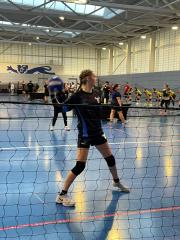







Join Joe's army of Volunteers
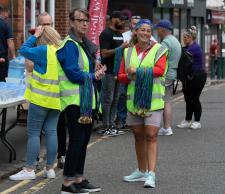


If you want to go the extra mile to help Joe's Trust raise awareness and reduce the incidence of sudden, cardiac death in young people, 12 - 35 years old, please come and join us. It doesn't matter whether you can sponsor an event, taking part in fundraising activities, hand out leaflets for an hour, or make a cup of tea.
Join Joe's growing army of volunteers who go the extra mile to make a difference to help JHMT save young hearts.
Forthcoming JHMT Events – Autumn 2023

The Joe Humphries Memorial Trust Christmas Craft Fair 2023 will this year be held on Sunday 5.11.23 from 11.am – 3.30pm at the Mountsorrel Memorial Centre. Come and join us for this lovely event where you can find locally sourced artisan products whilst helping The Joe Humphries Memorial Trust to save young lives.
Start your Christmas shopping early with some beautiful gifts, food and wine and unique beautifully crafted products all under one roof without pushing round shopping centres! You're sure to find that special individual gift from the wonderful choice on offer.
(THANKS to support from event sponsors PakPower & Juice)
For the latest in news and events from JHMT, please see our social media below.
